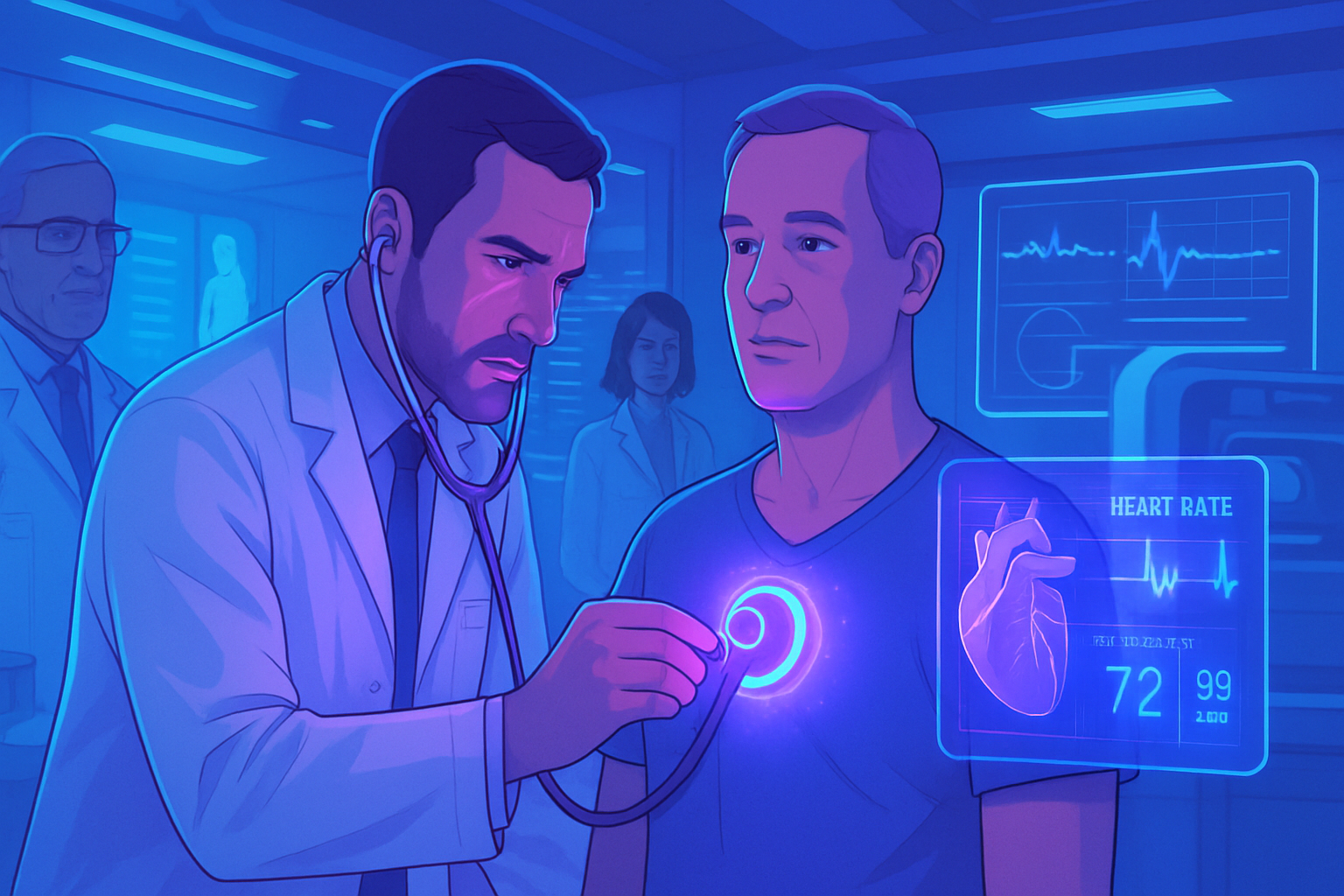An intelligent stethoscope revolutionizes cardiac diagnosis. The convergence of artificial intelligence with medicine offers a new horizon for the early detection of heart diseases. A team of doctors has developed a device capable of identifying three major cardiac conditions in just 15 seconds, an unprecedented advancement. This device promises acute diagnostics. By analyzing subtle variations in heart rhythm, it provides an innovative approach for at-risk patients. The public health stakes are considerable. The effects of this advancement could reduce hospitalizations and increase survival chances in cases of cardiac failure.
A Revolutionary Stethoscope
Doctors have designed an intelligent stethoscope capable of diagnosing major heart conditions in just 15 seconds. This device, the result of research conducted by experts from Imperial College London and Imperial College Healthcare NHS Trust, represents a significant advancement over traditional devices. Since its invention in 1816, the stethoscope had not experienced any major evolution until today.
Features and Methodology
This new instrument does not merely listen to the internal sounds of the body. Through artificial intelligence algorithms, it can analyze minute variations in heart rhythm and blood circulation, often undetectable by the human ear. It also records a ECG in real-time, allowing for a quick and accurate diagnosis.
Detection of Heart Diseases
The intelligent stethoscope is capable of detecting three critical heart conditions: heart failure, valvular heart diseases, and arrhythmias. Its speed and effectiveness provide significant results to doctors, facilitating the management of at-risk patients. Presented at the annual congress of the European Society of Cardiology in Madrid, this device represents an unprecedented advancement in the early diagnosis of heart diseases.
Importance of Early Diagnosis
An early diagnosis is essential for treating heart failure and other detected conditions. Research has shown that patients suffering from these conditions can benefit from faster access to appropriate treatments. In a study involving about 12,000 patients across 200 medical practices in the United Kingdom, those examined with the intelligent stethoscope showed significantly higher diagnostic rates.
Study Results
The results indicate that patients examined with this device were twice as likely to be diagnosed with heart failure. They were also three times more likely to suffer from atrial arrhythmia, a condition that increases the risk of stroke. Finally, the diagnostic rate for valvular heart diseases was also higher.
Technology and Treatment
The stethoscope, comparable in size to a playing card, works by recording the heart’s electrical signals and capturing the sounds of blood flow. These data are sent to a secure cloud server, where AI algorithms perform in-depth analyses. The result is sent back to a smartphone, enabling doctors to make informed decisions quickly.
Associated Risks
Although this device offers significant advantages, there is a potential risk of error. A greater number of patients might receive a misdiagnosis of conditions they do not have. Researchers have clarified that this device should only be used for patients showing suspicious symptoms, and not for routine checks on healthy individuals.
Future Perspectives
The widespread adoption of this tool could transform how general medicine addresses cardiac issues. With the intelligent stethoscope, general practitioners have a simple and quick means to identify potential cardiac problems. According to Dr. Mihir Kelshiker, these advancements could significantly change the landscape of public health.
Dr. Sonya Babu-Narayan, clinical director of the British Heart Foundation, emphasized that “early access to treatments can significantly improve the quality of life for patients.” This means that this technology could reduce the burden on emergency services while improving preventive care.
With the backing of the National Institute for Health and Care Research, this innovation could prove truly revolutionary. This tool equips clinicians to detect cardiac problems more swiftly, thus contributing to the fight against the leading causes of mortality in society.
For more information about this intelligent stethoscope, check out the following article: Actu AI.
Frequently Asked Questions about the Intelligent Stethoscope Detecting Heart Conditions
How does the intelligent stethoscope developed by researchers work?
The stethoscope uses artificial intelligence technology to analyze heart sounds and electrical signals from the heart, allowing for rapid detection of conditions such as heart failure and atrial fibrillation.
How long does it take to get a diagnosis with this stethoscope?
It only takes 15 seconds to conduct an examination and obtain a preliminary diagnosis regarding major cardiac conditions.
What heart conditions can be detected by the intelligent stethoscope?
The intelligent stethoscope is capable of detecting three main heart conditions: heart failure, valvular heart diseases, and abnormal heart rhythms.
Can the stethoscope replace traditional medical examinations?
No, it does not replace comprehensive medical examinations but serves as an early screening tool to identify patients at risk of cardiac problems.
What are the advantages of using this stethoscope compared to a classic stethoscope?
This stethoscope allows for a more accurate analysis of heart sounds, detects anomalies that the human ear cannot hear, and performs an ECG simultaneously.
Who can benefit from the use of this intelligent stethoscope?
This stethoscope is particularly beneficial for patients experiencing symptoms such as breathlessness or fatigue, as it allows for early diagnosis and timely treatment.
What are the limitations of this intelligent stethoscope?
While effective for screening, there can be cases of false positives where a person may be flagged as at risk when they are not, so its use should be targeted.
What is the potential impact of this stethoscope on the healthcare system?
It could contribute to earlier diagnosis and better management of heart diseases, potentially reducing hospitalizations and improving health outcomes.
Can the intelligent stethoscope be used by general practitioners?
Yes, this tool is designed to be easily used by general practitioners to quickly detect cardiac problems in a primary care setting.






